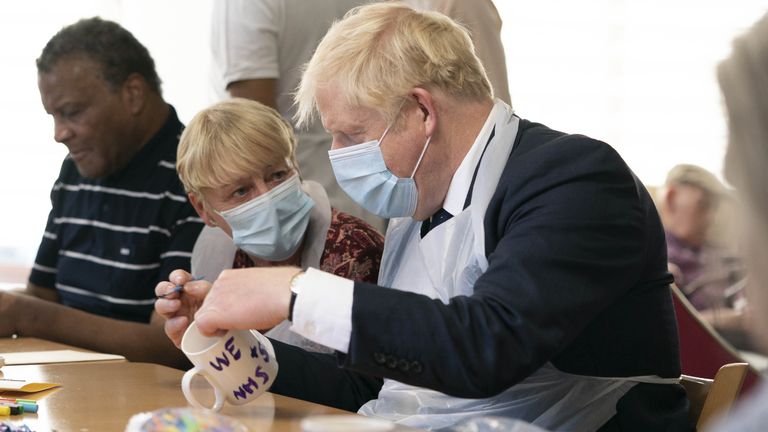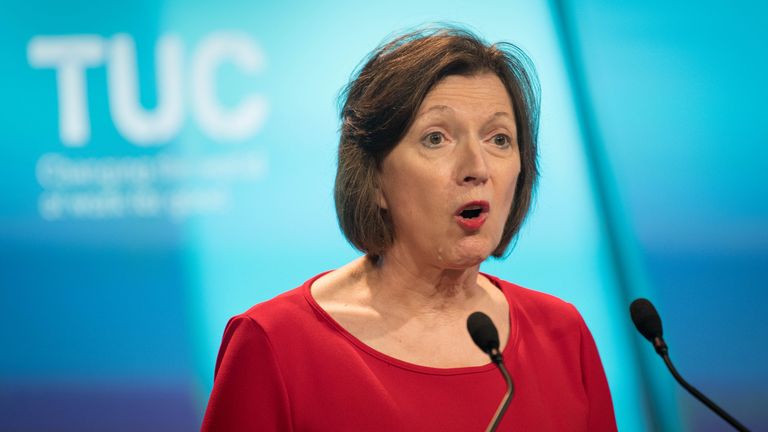
TUC conference: Frances O’Grady piles pressure on Labour leader Sir Keir Starmer to back wealth tax to fund social care
The leader of Britain’s trade unions has piled pressure on Sir Keir Starmer to back a wealth tax – a rise in capital gains tax – to fund social care.
In her speech at the TUC conference on Monday, Frances O’Grady said the service desperately needs money now and declared: “Tax wealth to fund social care.”
Her call came on the eve of MPs debating the legislation to enact Prime Minister Boris Johnson’s National Insurance hike – to boost NHS funding and help pay for social care reform in England – and the Labour leader’s own speech to the TUC.
The TUC chief’s wealth tax demand echoes calls from Greater Manchester mayor Andy Burnham, as well as left-wing Labour MPs, and will increase pressure on Sir Keir to back the plan at his party conference in two weeks’ time.
In an interview with Sky News’ political editor Beth Rigby last week, Sir Keir said he would back wealth taxes to fund social care reform, but refused to reveal if he had his own plan.
After criticism for failing to unveil his own proposals for reforming social care, the Labour leader said a “range of options” needed to be looked at.
Ms O’Grady, the TUC general secretary, began her conference speech condemning the low pay of a social care worker, Carol, who is paid less than the minimum wage for a 24-hour shift.
“That’s why the TUC is calling for a rise in capital gains tax to fund social care,” she said. “So the service gets the money it desperately needs: not in a few years, not maybe, but now.
“So that every social care worker’s pay rises to at least £10 per hour. And so that wealth is taxed at the same rate as people who work for a living.
“Because it can’t be right that a dedicated care worker pays a bigger share of her hard-earned income to fund the social care system than the private equity magnate who profits from buying up and selling on care homes.
“So I say this to the Chancellor Rishi Sunak: go and work in Carol’s care home for a week. Put in the same shifts she does. And try living off her pay.
“Instead of raiding low-paid workers’ wage packets, the government should think again: Tax wealth to fund social care.”
The TUC claims increasing capital gains tax to the same level as income tax and getting rid of exemptions could raise up to £17bn a year for social care.
Ms O’Grady also urged the prime minister to “level up” Britain by backing pay rises for workers, scrapping his proposed cut in Universal Credit and tackling child poverty.
Challenging Mr Johnson to deliver on his promises, the general secretary said: “Ministers tell us they’re going to ‘level up’ Britain.
“But levelling up means nothing if they freeze key workers’ pay, slash Universal Credit, and the number of kids in poverty soars.
“So, I have a challenge for the prime minister. If levelling up means anything, it must mean levelling up at work and levelling up living standards.”
The TUC chief also called for talks with employers to tackle staff shortages, which were beginning to bite in key industries, she said.
“We’ve seen the headlines,” she said. “Nandos running out of chicken. IKEA running out of mattresses. Wetherspoons running out of beer.
“Suddenly, supply chains matter. The people who keep essential supplies moving should matter too.
“But after long hours, many HGV drivers are sleeping in their cabs on lay-bys. No payments for truck stops. No place to wash. No toilet facilities. Treated worse than animals.”
Sir Keir on Monday accused Mr Johnson of “hammering working people” with his plan to hike National Insurance contributions in order to fund reform of social care in England and provide a COVID bailout for the NHS.
“Our analysis is that you could raise this money in other ways, whether that’s capital gains tax, whether that’s on properties, stocks and shares or dividends,” the Labour leader said.
“He’s not even trying. He’s gone straight for hammering working people.”
Mr Johnson has said the cost of the proposed “health and social care levy” programme will be split between individuals and businesses and “those who earn more will pay more”.
The plans include a cap of £86,000 on what people will be asked to pay over their lifetime for care.
Source: Read Full Article


